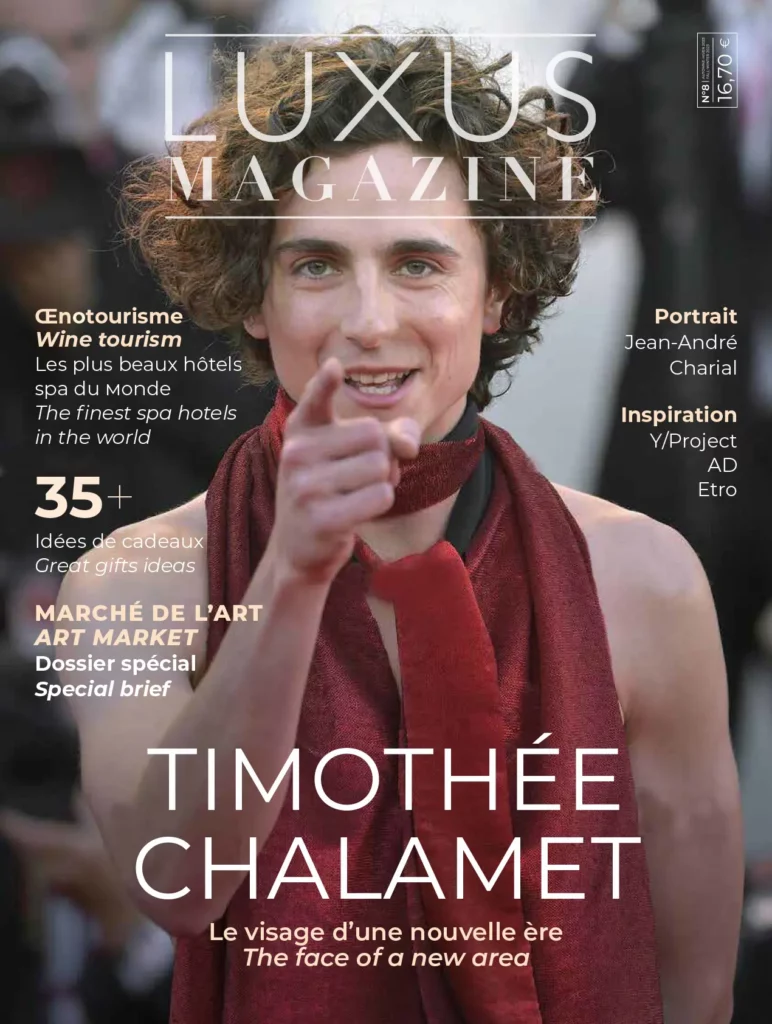The Plaza Athénée celebrates its flamboyant 110th anniversary

On April 20, 1913, the emblematic Parisian palace on Avenue Montaigne opened its doors. To celebrate 110 years of opening, know-how, excellence, and fashion, the Plaza Athénée offers its guests an anniversary under the sign of music and elegance, all enhanced by its geranium red.
The hotel, one of the first Parisian establishments to be certified as a palace, is preparing festivities worthy of the event.
The Plaza in Gala dress
The entire hotel, including its restaurants, will be offering a warm musical atmosphere.

A guitarist-singer duo, installed in the lobby, performs in the gallery. In the Relais Plaza restaurant, a pianist enthusiastically enlivens the evening. And the melodious sounds of a cellist accompanied by a flutist resonate in the gastronomic restaurant Jean Imbert at the Plaza Athénée.
In addition to this musical entertainment, the hotel is dressed in festive ephemeral scenography. A paper work of art is displayed in the lobby. It is composed of dozens of handmade elements, requiring over a hundred hours of work.
Finally, the hotel’s signature flamboyant red color is used to decorate its lounges, while the famous geraniums begin their annual outing, hanging from its balconies, which are borrowed from art deco.
An elegant who doesn’t look her age
“Once upon a time, the Palace of Tomorrow”: its signature perfectly captures the colorful history of this Parisian institution in the City of Light. This exceptional longevity is explained by its ability to constantly renew itself without denying its heritage.

It all began in 1911 when the current building was constructed at 25 Avenue Montaigne.
The Plaza Athénée, the work of renowned architect Charles Lefebvre, opened its doors on April 20, 1913. At the time, the establishment had sixteen rooms per floor as well as an apartment on the top floor. It was only a few days before the opening of another reference of Parisian festivities: the Champs Elysées theater. Because of its proximity, the establishment quickly became the favorite place for composers and music and theater lovers.
With its success, the hotel doubled in size during the Roaring Twenties. Several large apartments and salons were added, again designed by the architect Charles Lefebvre.
The Galerie des Gobelin and the Relais Plaza restaurant became the scene of mythical evenings where Josephine Baker, Rudolph Valentino, and Maurice Chevalier gathered. But it was the actress Marlene Dietrich who left her mark on the muffled atmosphere of the place. In 1933, she stayed there for three weeks and occupied no less than seven rooms.
In 1936, the hotel acquired a chic brasserie, the Relais Plaza, an exact copy of the layout of the restaurant on the liner Le Normandie.
1947 marked a turning point in the history of the Plaza Athénée with the installation of Christian Dior at number 30 Avenue Montaigne. From then on, the hotel began to be associated with the Paris of art and fashion.
Later, the establishment saw such mythical personalities as Jacky Kennedy, Gary Cooper, and Grace Kelly pass through. In 1971, the hotel welcomed the iconic Hollywood couple Richard Burton and Elizabeth Taylor for six months.
The big changes came in 1999 with François Delahaye was appointed general manager. It was his idea to call on Chef Alain Ducasse to supervise the hotel’s catering and, in particular, to orchestrate the menu of the Alain Ducasse restaurant at the Plaza Athénée.
The hotel became part of the Dorchester Collection Group in 2001. Alain Ducasse became the first chef to earn three stars in a hotel. The hotel is also the first to hire a pastry chef with Christophe Michalak.

In 2013, the Plaza Athénée closed its doors to carry out major expansion and renovation. A way to fight against Asian competition is with the arrival of the Mandarin Oriental, the Shangri-La, or the Peninsula in the capital. An ambition made possible by the purchase, three years earlier, of three buildings adjacent to the palace.
In the meantime, in 2011, the Plaza Athénée was awarded the title of the palace, alongside the Meurice Hotel, one year after obtaining the label of living heritage company.

When the palace reopened, the gourmet restaurant was transformed by designers Patrick Jouin and Sanjit Manku, who installed oversized stainless steel serving bells. The duo also renovated the bar, which dated from 2002: the new one, made of cast resin, was created by a specialist in automobile construction.
Two interior designers joined this major modernization project: Bruno Moinard was responsible for decorating the living spaces, and Marie-José Pommereau for decorating the rooms and apartments. The first six floors were renovated in the Haussmann style, and the seventh and eighth levels in the Art Deco style. In addition, 14 new suites were created, bringing the number of keys to 208.
This unusual four-handed renovation proposes a new vision of the premises around the marvelous, the surprising, and the haute couture spirit.
In 2018, the Plaza Athénée once again called on Bruno Moinard’s agency, but this time for the decoration of the 22 rooms and suites on the seventh floor. These mostly attic rooms offer more intimate spaces – like an apartment – dressed in a completely revamped art deco style. However, it was not until after the pandemic that they were inaugurated.

In September 2022, Chef Jean Imbert took over the reins of the hotel’s gourmet restaurant, now called Jean Imbert, at the Plaza Athénée. He also became the new organizer of the hotel’s festivities. He has the idea of offering private summer screenings of classic films in the open air of the mythical courtyard garden.
An event that complements the installation, every winter – since 2019 – of an ephemeral ice rink in the same courtyard garden.
An Haute Couture address
If there is one personality trait unique to the Plaza Athénée, it is its proximity to the world of fashion and luxury. And its geographical location is not for nothing in its fashion victim profile!
Located on Avenue Montaigne – also known as “Avenue of Fashion” – the establishment counts Christian Dior among its neighbors. It is said that the famous couturier opened his very first boutique here in order to seduce the hotel’s rich clientele. As early as 1947, the man who revolutionized fashion with the new look and his bar suit became a regular guest at the hotel. His first collections, named “Plaza” and “Athénée,” were inspired by the elegant women seen at the hotel bar.
Since then, it is as if the figure of Christian Dior has never left the hotel. The Eiffel suite, a tribute to his world with its powder pink and Trianon gray, visible in season 1 of the Netflix series “Emily in Paris” or the hotel spa managed by the House of Dior. This Dior Spa Plaza Athénée opened more than ten years ago, offers an exceptional treatment menu in an extraordinary setting.
The Plaza Athénée has also become famous for its celebrations linked to the fashion world – such as its red dinners – or its suites, used as showrooms by young designers.

A sublimated vision of fashion that has been transcribed many times on screen. Whether in the cinema with Pascal Chaumeil’s Arnacoeur (2010) or The Devil Wears Prada, adapted from the eponymous novel by David Frankel (2006). Or via the series: in the final episode of Sex & The City (2004), the hotel is presented by Carrie Bradshaw – her heroine and fashionista Jimmy Choo shoes – as her favorite place in Paris.

The Plaza Athénée has thus set itself a major objective to offer “the feeling [its customers] of being at the heart of an haute couture creation.”
Read also > OKURA HOTEL TOKYO HONORED BY CONDÉ NAST TRAVELER AND CRYSTAL AWARDS 2022
[EN] VICTOR GOSSELIN IS A JOURNALIST SPECIALIZING IN LUXURY, HR, WEB3 AND RETAIL. HE PREVIOUSLY WORKED FOR MEDIA SUCH AS SPARKS IN THE EYES, WELCOME TO THE JUNGLE, LE JOURNAL DU LUXE AND TIME TO DISRUPT. A GRADUATE OF EIML PARIS, VICTOR HAS EXPERIENCED MORE THAN 7 YEARS IN THE LUXURY SECTOR BOTH IN RETAIL AND EDITORIAL. CULTIVATING A GREAT SENSIBILITY FOR THE FASHION & ACCESSORIES SEGMENT, HERITAGE TREASURES AND LONG FORMAT, HE LIKES TO ANALYZE LUXURY BRANDS AND PRODUCTS FROM AN ECONOMIC, SOCIOLOGICAL AND CULTURAL ANGLE TO UNFOLD NEW CONSUMPTION BEHAVIORS. BESIDES HIS JOURNALISTIC ACTIVITY, VICTOR ACCOMPANIES TECH STARTUPS AND LARGE GROUPS IN THEIR CONTENT PRODUCTION AND EDITORIAL STRATEGY. HE NOTABLY LAID THE FOUNDATIONS FOR FASHION & LUXURY TRENDY FEATURE ARTICLES AT HEURITECH AND WROTE THE TECH SPEECHES OF LIVI, INNOVATION INSIDER OF THE LVMH GROUP.************** [FR] Victor Gosselin est journaliste spécialiste des univers luxe, RH, tech et retail, passé par Sparks In The Eyes, Welcome To The Jungle, le Journal du luxe et Time To Disrupt. Diplômé de l’EIML Paris, il dispose de plus de 7 ans d’expérience dans le secteur du luxe aussi bien sur la partie retail que éditoriale. Cultivant une grande sensibilité pour le segment mode & accessoires, l’Asie, les trésors du patrimoine et le long format, il aime analyser les marques et produits de luxe sous l’angle économique, sociologique et culturel pour révéler de nouveaux comportements de consommation. En parallèle de son activité journalistique, Victor accompagne les startups tech et grands groupes dans leur production de contenu et leur stratégie éditoriale. Il a ainsi posé les bases des articles de fond tendanciels Mode & Luxe chez Heuritech ou encore rédigé les prises de parole tech de Livi, Innovation Insider du groupe LVMH.



